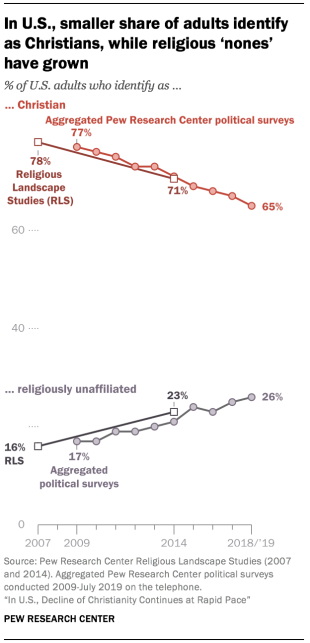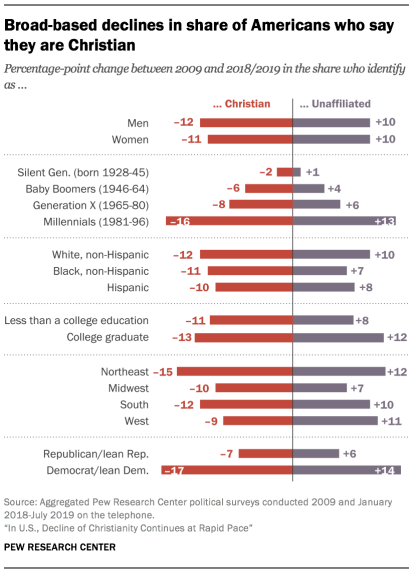The religious landscape in America is rapidly changing, as Americans are becoming less likely to identify with a specific affiliation, in particular, Christianity, according to new numbers from a Pew Research Study.
The Pew Research Center found Americans are becoming less likely to declare themselves Christian, with the decline particularly accelerating amongst younger generations.
The study, conducted in 2018-2019, shows that only 65 percent of American adults declare themselves as Christians when asked their religion, which has gone down 12 percentage points over the last 10 years.
Over that same period the number of people who declared themselves atheist, agnostic, or “nothing in particular” had the opposite effect, rising in 17 percentage points.
The study shows that more than a quarter of the adult population in the U.S. considers themselves atheist, agnostic, or “nothing in particular.”

Two of the largest Christian denominations are experiencing the greatest losses in numbers: Protestantism and Catholicism.
In 2009, 51 percent of U.S. adults surveyed said that they identified with Protestantism, now only 43 percent say the same. Meanwhile, in 2009, 23 percent of the adult population said they identified as Catholic, that’s down to 20 percent.
“Although churches and faith movements continue to exert strong political influence on the Trump administration and at the state level, the proportion of American adults attending religious services has declined,” Harriet Sherwood pointed out in The Guardian.
In 2009, only 2 percent of American adults identified as atheists, which doubled over the past decade to 4 percent of the population. Agnostics only made up 3 percent of the adult population in 2009, whereas they now make up 5 percent. Adults who associate with “nothing in particular” have grown from 12 percent in 2009, to 17 percent now.
With the Christian population shrinking, church attendance has also dropped. Since 2009, the number of people going to church at least once or twice a month has fallen by seven percentage points.
More dramatically, the number of Americans attending religious services a few times a year is at 54 percent, while only 45 percent say they attend one monthly.
The change in attitudes has hit the younger generations the most, with only 49 percent of millennials identifying as Christian, 40 percent identifying as “religious nones,” and 9 percent with other faiths.
When it comes to church attendance, 22 percent of millennials say they never attend religious services, while the same percentage says they attend every week.

“Religious ‘nones’ have grown across multiple demographic groups: white people, black people and Hispanics; men and women; all regions of the country; and among college graduates and those with lower levels of educational attainment,” the Pew report adds.
“Religious ‘nones’ are growing faster among Democrats than Republicans, though their ranks are swelling in both partisan coalitions. And although the religiously unaffiliated are on the rise among younger people and most groups of older adults, their growth is most pronounced among young adults.”
The Pew Research Center compiled data from telephone surveys conducted in 2018 and 2019.



